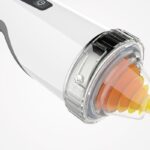Everything that has been written in this blog is a personal view, that has been backed up by years of experience of Ms. Doel Bose as an Embryologist and more so because she is a self made woman, who has spent years of her early twenties and thirties in learning and working. This blog is not a post on feminism, it is just a practical thought process mixed with scientific evidence.
Pension Plans secure our retirement and we proactively invest or save for our retirement, or at the least are supposed to do so.So why does it not make sense to invest in our Fertility and secure our future parenthood chances? Why shouldn’t young women and even men, invest and bank their gametes for future.?
There is an irreversible Impact of age on your Fertility. This is a topic that needs no elaboration, google it and you will find at least 50 good studies and articles that mention the impact that age can have on your gametes especially oocytes. Age impacts female fertility more than men. After the age of 35 there is sharp decline in the ovarian reserve for a woman. The uterus however is not as susceptible to aging as the ovaries. Recent studies have also suggested that Men over 40’s do show a decline in their semen parameters that can eventually affect the fertility potential of the couple.
Fertility Investment for Men is very simple, just go ahead and cryopreserve your semen for a couple of years. Very inexpensive, very easy and non invasive. And the technique for cryopreservation of sperm is very effective too.
However, when it comes to women, nothing is that easy!
A hard working professionally oriented girl reaches the age of 23 or 24 by the time she finishes her Master’s Degree. Another 2 to 3 years of work experience finally gives her an edge over others professionally, where she can think of getting due promotions and earning good money. This makes her reach 27 or 28 years of age. Culturally we want her to “settle down” while she is thinking all the while of “making it big”. Even if she gets marries by 28, the couple is not going to jump into parenthood right away. Give or take 2 to 3 years of roaming around the globe and getting to know each other, the girl, now a woman has crossed the 30 year mark.
Given the amount professional commitments and work induced stress and other environmental factors including aging oocytes, this woman is not going to find the job of getting pregnant as easy as a 25 year old. We haven’t even discussed the stress and age related factor on the Man yet. So yes, 1 in 6 couples will face issue in conceiving naturally and will need help from an Assisted Reproduction procedure which could be as simple as follicular monitoring, Intra Uterine Insemination to IVF / ICSI.
So what should we advocate our ambitious young girls? Should we ask them to sacrifice their professional dream and ask them to first get married right after college for the sake of human race?Tell them that they should first fulfil their reproductive goals before they can fulfil their career goals ?All of this just because their biological clock is ticking?? Is this even FAIR?
As an Embryologist, Ms. Doel Bose strongly believes in the concept of fertility preservation or Social Freezing because she has seen assisted reproductive techniques like vitrification evolve in past few years and making it completely safe to cryopreserve gametes for long duration of time.Well trained Embryologist’s can cryopreserve oocytes and embryos with 100% cryo survivability for sure.
Ideally women should freeze their oocytes before they reach 30 if they are not married by then. However, in case you are married and in your early thirties and think that you would want to delay motherhood for a few years, it makes complete sense to undergo an IVF cycleand freeze your Embryo’s. This way you can plan to transfer the embryo’s when you are READY. Freezing your Embryos or oocytes will ensure that you will not run out of your ovarian reserve later down the line and will not have to opt for Oocyte Donor when you decide to have children.
A short video showing the process of oocyte cryopreservation in IVF Lab.
However sometimes, even after multiple trials, IVF cycles fail to achieve pregnancy with own oocytes, such females have to be ready to undergo oocyte donation cycle to achieve pregnancy.
Ms. Bose has spoken to many such women who struggle with multiple IVF failures due to advancing maternal age as an Embryologist. When asked, would they have chosen to voluntarily freeze their embryos in their early thirties if they had an option and awareness, would they do so? The answer without any second thought is Yes.
This lack of awareness amongst young women needs to be addressed. Masters programme should have sessions in Universities to cover this subject. So should corporates employing young generation. Every individual, whether man or woman should be aware of what they are getting into and more importantly, they should know, what are their choices.










